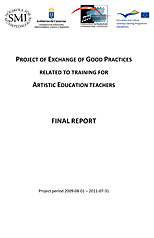GRUNDTVIG PROJECT 2009–2011
Project Title and Time Frame
Exchange of Good Practices relating to training for Artistic Education Teachers 01.08.2009 – 31.07.2011
Project Partners
- Gobierno de Canarias Consejería de Educación, Universidades, Cultura y Deportes. DG de Formación Profesional y Educación de Adultos (Spain – coordinator)
- Landesverband der Musikschulen in Rheinland-Pfalz LVdM (Germany)
- Stockholms Musikpedagogiska Institut SMI (Sweden)
Aims
The aim of the project centred on the exploration of possibilities and priorities for effective professional development of predominantly music (instrumental and vocal training) teachers in European isolated and hard-to-reach rural areas.
Method
The project methodology was based on a series of study visits to the partnership countries to conduct activities of observation and practical demonstration, participation, discussion and analysis, implementation and dissemination. General meetings for the project were incorporated in the study visits conducted. At the end of the project a survey was conducted to provide further information on the needs of directors and teachers of music schools, with reference to the examples of best practices we encountered during the visits.
Study visits conducted:
29.09.2009 – 01.10.2009 Kusel (Rhineland-Palatinate, Germany)
02.11.2009 – 07.11.2009 Stockholm (Sweden)
18.01.2010 – 21.01.2010 Tenerife / La Palma (Spain)
22.03.2010 – 26.03.2010 Region of Gävleborg (Sweden)
03.09.2010 – 07.09.2010 Region north / west Rhineland-Palatinate (Germany)
08.11.2010 – 11.11.2010 Gran Canaria / Lanzarote (Spain)
23.05.2011 – 28.05.2011 Gotland (Sweden)
Survey conclusions (summary):
The teachers of all three countries express a great interest generally in participating in teacher-training and professional development courses. The biggest common fields of interests would appear to be teacher-training concerning tools and methodologies for group instrument teaching, early childhood music and movement and music-teaching to the mentally and physically challenged in music schools. The teachers from the Canary Islands and Sweden also show a great common interest in the application of new technologies and IT to the teaching of music and aural-based pedagogy and improvisation.
Solutions for delivering professional development is however, as described in the final report under the section Challenges and obstacles, a complex and logistically difficult problem. There are many reasons why, for example:
- a) Many schools have several part-time and casually employed teachers who do not have time allocated for teachers training in their timetables
- b) It becomes too costly to send the teacher to in-service training, the distances are great and they have few teachers by instrument or subject.
- c) Parents expect their children to receive their classes each week and teacher-training is left to take place during holidays or before or after the semester starts to avoid "normal teaching weeks" being affected.
Best Practices
The project has presented in the Final Report a number of examples of best practices encountered through the study visits in the project, predominantly in the following areas:
- Tools and methodologies for group instrument teaching, aural-based pedagogy and improvisation
- Music-teaching to the mentally and physically challenged
- Music-teaching to recently immigrated children and families
- The application of new technologies and IT to the teaching of music
- Didactical approaches and the development of teacher-training
- High-schools that incorporate artistic expression with programs of study
- Collaboration between government, higher education, local council/community and music schools in joint interest development.
- Early childhood music and movement
Recommendations
The project has identified a number of strategies for further exploration, including:
- Networking for the recognition and sharing of valued competency and experience
- Development and sharing of tools and materials for learning, eventually through an e-learning platform
- The development of higher education programs, in-service training and professional development courses in direct collaboration between music schools and tertiary institutions
- The inclusion of professional development as an integral part of the teacher's employment conditions
